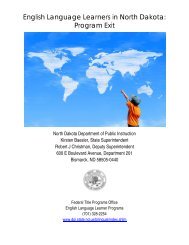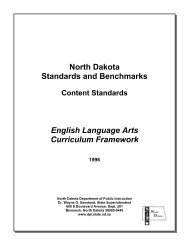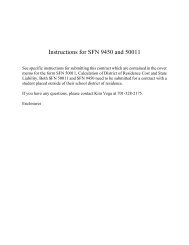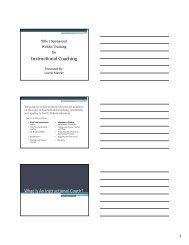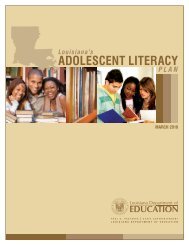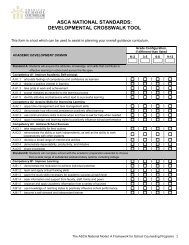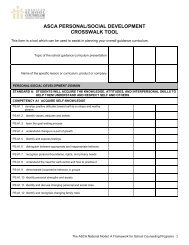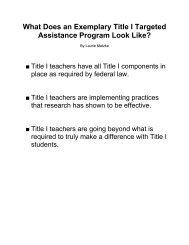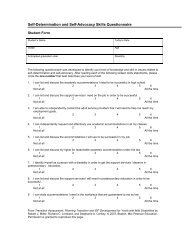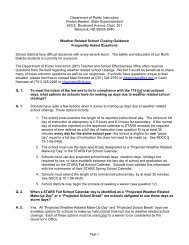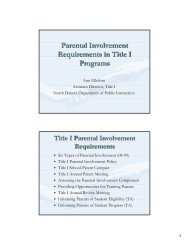Coordinated Set of Needed Activities/Strategies Examples
Coordinated Set of Needed Activities/Strategies Examples
Coordinated Set of Needed Activities/Strategies Examples
Create successful ePaper yourself
Turn your PDF publications into a flip-book with our unique Google optimized e-Paper software.
8<br />
17. Develop skills to know where and how to find post school housing<br />
18. Sign up for utilities (gas, water, electric, telephone, cable, etc.)<br />
19. Learn to operate a washer and dryer<br />
20. Visit a local car dealer to determine whether to buy or lease a car<br />
21. Prepare an initial housing budget (down payment, furniture, bath towels, cleansers, utilities, etc.)<br />
22. Cost compare for household items (appliances, linens, etc.)<br />
23. Meet with a doctor to discuss birth control/family planning options<br />
24. Manage daily time schedule<br />
25. Open a checking/savings account<br />
26. Manage money and pay bills<br />
27. Meet with a family financial planner<br />
28. Listen to the weather forecast to plan daily/weekly outings<br />
29. Develop a personal fitness routine<br />
30. Obtain a bank ATM card<br />
31. Visit a bank to discuss a car or school loan<br />
32. Meet with a potential landlord<br />
33. Investigate local insurance companies for automobile and rental or homeowner’s insurance<br />
34. Maintain a home or residence interior and exterior<br />
35. Skill training to purchase food<br />
36. Skill training to prepare meals<br />
37. Skill training in purchasing clothing and learning how to care for clothes<br />
38. Skill training to learn about the physical and personal care <strong>of</strong> children<br />
39. Learn and practice decision making skills<br />
40. Learn time management skills<br />
41. Skill training to care for personal toileting needs<br />
43. Skill training to dress and undress self<br />
44. Skill training to communicate personal information (i.e. name, address, gender, telephone number)<br />
45. Skill training to prepare and serve foods which requires little or no cooking<br />
46. Skill training to demonstrates acceptable eating behaviors (i.e. uses utensils appropriately, chews with mouth<br />
shut, takes appropriate sized bites, uses napkin, practices good manners)<br />
47. Skill training to dress appropriately for specific situations (i.e. weather, special events, casual, seasonal)<br />
48. Skill training in maintaining a comfortable room temperature in the home (i.e. open and close windows, adjust<br />
a thermostat, open and close doors)<br />
49. Skill training to chose and wear clothing appropriate in size, color, patter, and style<br />
51. Skill training to demonstrate safety precautions in the home (i.e. use <strong>of</strong> locks, proper use <strong>of</strong> appliances)<br />
52. Skill training to recognize when clothing repair is necessary and when to either mend the item or arrange for<br />
assistance<br />
53. Skill training to develop an understanding <strong>of</strong> words found in the home environment (i.e. on appliances, on<br />
medicines, on recipes)<br />
54. Skill training to act responsibly in caring for own and others’ property<br />
55. Skill training to prepare and serve simple foods which require cooking<br />
56. Skill training to develop a neat appearance (i.e. hair style, proper use <strong>of</strong> make-up, appropriate shaving, clean<br />
clothing)<br />
57. Skill training to maintain a clean body (i.e. bathe, use deodorant, brush teeth, care for menstrual needs,<br />
wash/dry hair)<br />
58. Skill training to determine temperature by reading a thermometer<br />
59. Learn to prepare and serve at least 3 simple meals which require little or no cooking<br />
61. Training to demonstrate proper judgment in food storage<br />
62. Skill training to learn how and when to seek medical assistance<br />
63. Skill training on how to treat minor illnesses (i.e. headaches, nausea, fever, body aches)<br />
64. Develop skills to perform light household maintenance (i.e. simple repairs, change light bulbs, unclog drain)<br />
66. Demonstrate qualities <strong>of</strong> a good citizen (i.e. obeys rules and laws, shows consideration for others,<br />
respects the environment)<br />
Adapted from Helping Educators, Parents and Other Stakeholders Understand: Postschool Outcomes,<br />
Course <strong>of</strong> Study and <strong>Coordinated</strong> <strong>Set</strong> <strong>of</strong> <strong>Activities</strong> by Ed O’Leary and Wendy Collison, 2002




